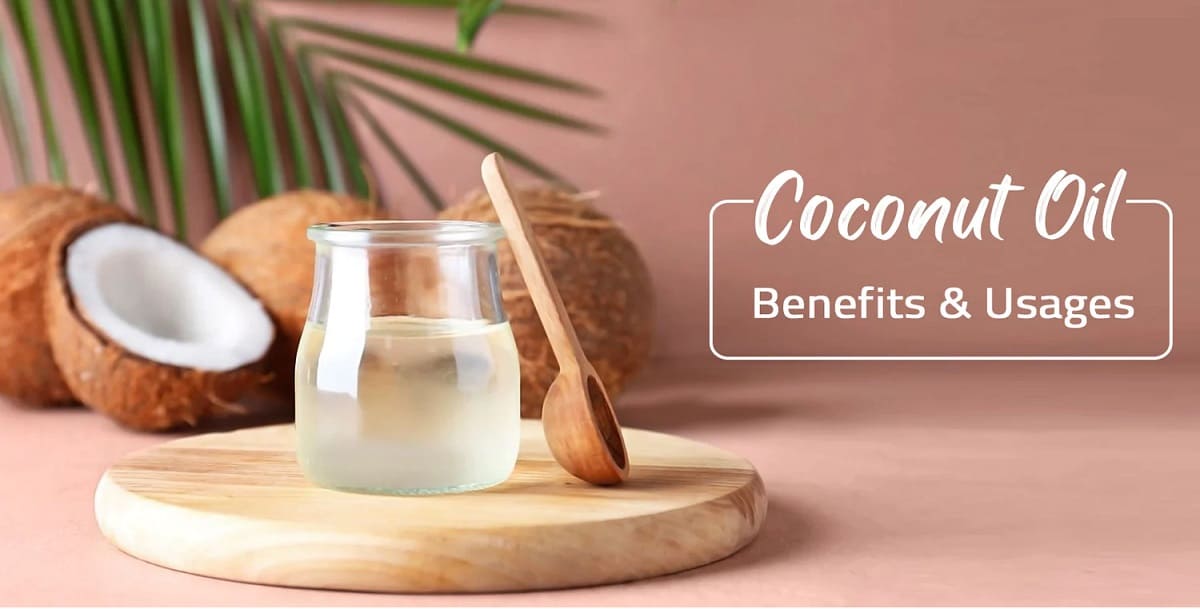What Happens if Coconut Oil Gets in Your Eyes? Benefits of Coconut Oil 2025

Coconut oil is widely used for skin care, hair care, and natural wellness. It feels gentle and safe, which is why many people worry when it accidentally reaches the eyes. This guide explains what happens when coconut oil gets into your eyes, how to handle it safely, and the real benefits coconut oil offers for everyday use. You will also find answers to common questions and a clear conclusion to help you feel confident using coconut oil in your routine.
Disclaimer: This article is for informational purposes only. It is not a substitute for medical advice, diagnosis, sis, or treatment. If you experience serious discomfort, vision problems, or irritation after getting coconut oil in your eyes, seek help from a medical professional.
Read More: Dehydration Headache: Symptoms, Treatment & Prevention
What Happens if Coconut Oil Gets in Your Eyes
Coconut oil is considered gentle and non-toxic, which is why getting a little of it in your eyes does not usually lead to serious problems. Still, the experience can feel unpleasant. Imagine your eye as a smooth glass surface and the oil as a thick, cloudy layer sitting on top. It blocks your view for a moment and makes everything look blurry.
So what exactly happens
Temporary Blurriness
The most common effect is blurry vision. Coconut oil is thick and creates a film over the surface of the eye. It does not damage the eye, but it can disturb clear vision for several minutes. It is like trying to look through a smudged window.
Mild Irritation
Some people may feel a slight stinging or burning sensation. This does not happen because the oil is harsh, but because the eye is extremely sensitive to foreign substances. The irritation is usually mild and settles soon after rinsing.
Watery Eyes
The eyes may begin watering as a natural defense mechanism. This is the body trying to wash away the oil on its own.
Rare Allergic Reaction
Although uncommon, a few people may be sensitive to coconut products. If redness, swelling, or swelling continues longer than expected, then you may be facing an allergic reaction. In such cases, medical attention is important.
Does Coconut Oil Damage the Eyes
There is no evidence that coconut oil causes lasting harm when it enters the eyes. The discomfort you feel is usually short-lived and more annoying than dangerous.
What To Do If Coconut Oil Gets in Your Eyes
Most of the time, you can handle the situation at home. Here is a simple step-by-step approach.
Rinse Your Eyes With Clean Water
Blinking under cool running water helps wash out the oil film. It is one of the fastest ways to feel relief. Do it for at least ten to fifteen seconds.
Use Artificial Tears If Needed
If your eyes still feel greasy or irritated, you can use artificial tears. They help flush out the remaining oil and soothe the surface of the eye.
Do Not Rub Your Eyes
Rubbing feels tempting, but it can make irritation worse. Think of your eyes like delicate silk fabric. Gentle care is always better.
Give Your Eyes a Few Minutes
Sometimes vision stays slightly blurry even after rinsing. This usually fades as your natural tears clean the eye.
Seek Medical Advice If Symptoms Continue
If discomfort lasts for more than an hour or if you have pai, swelling, or trouble seeing, then you should contact a medical professional.
Why Coconut Oil Affects Vision Temporarily
To understand the blurriness you feel, I think about the texture of coconut oil. It is thick, smooth, and slow to dissolve in water. When it coats the eye surface, it does not wash away instantly because tears are water-based. The oil simply floats until blinking and rinsing pushes it aside.
This is why the effect is mild and temporary. The oil does not penetrate the eye. It just sits on top like a layer of lotion on glass.
Is It Safe To Use Coconut Oil Around the Eyes
Many people apply coconut oil near the eyes for makeup removal, moisturization, and skin softening. When used properly, it is generally safe. The key is to use small amounts and avoid putting it directly into the eye.
Here are a few tips
Use Clean High Quality Coconut Oil
Since the area around the eyes is sensitive, it is better to use pure extra virgin coconut oil.
Remove Makeup Gently
Coconut oil breaks down makeup well, but be sure to wipe away the residue slowly to avoid pushing oil into your eyes.
Avoid Using It On Eyelashes Before Bed
When applied too close to the lash line, it may slip into the eye while you sleep.
Benefits of Coconut Oil

Coconut oil is popular for a reason. It offers a variety of benefits that make it useful in daily life. Here are some of the most well-known advantages.
Moisturizes Dry Skin
Coconut oil acts like a natural barrier that locks in moisture. It smooths dry areas and can help maintain soft skin. Many people use it on elbows, knees, and feet for comfortable hydration.
Supports Hair Health
If your hair feels brittle or dull, coconut oil can help nourish it. The oil penetrates strands more easily compared to some other products. It adds shine,ne reduces breakage, and helps with detangling.
Helps Reduce Frizz
Coconut oil works like a gentle weight on frizzy hair, making it look smoother and more manageable.
Useful for Massage
The so,f t warm texture of coconut oil makes it a favorite choice for massage. It glides easily,ily provides a pleasant scent, and leaves the skin feeling silky.
Natural Makeup Remover
Coconut oil can easily break down waterproof makeup. It works like a gentle cleanser that removes products without pulling on the skin.
Soothes Some Skin Irritations
People often use it for minoirritationst dryness ss and flaking. Its calming nature helps support the skin’s protective layer.
Helps Strengthen Nails and Cuticles
Massaging a little coconut oil into the nails can help reduce dryness and brittleness.
Contains Antioxidants
Coconut oil offers natural antioxidants that support skin health. These antioxidants help protect the skin from environmental stress.
Is Coconut Oil Safe for Sensitive Skin
Many people with sensitive skin prefer coconut oil because it feels gentle and simple. Still it may not work for everyone. Some skin types, especially o ily skin, may find it too heavy. Always test a small amount first.
How To Use Coconut Oil Safely Every Day
Using coconut oil correctly helps you enjoy its benefits without any issues.
Start With a Small Amount
A little goes a long way. Begin with a pea-sized amount for the face or hands.
Avoid Applying It Directly to the Eyes or Inside the Nose
The oil is not harmful, but it can feel uncomfortable.
Store It Properly
Keep coconut oil in a cool, dry place so it stays fresh and clean.
Choose the Right Type
Unrefined coconut oil keeps more of its natural scent and ppropertiesewhile refined versions have a lighter smell.
Can Coconut Oil Be Used for Eye Conditions
Some people try using coconut oil for dry eyes or irritation, but this is not recommended. While the oil itself is tle, it is not approved as an official treatment for eye problems. The eyes need moisture, water-based based not oil-based. Natural tears and artificial tears work better.
Using coconut oil inside the eye may trap dirt or bacteria, which can cause more irritation. It is always safer to keep coconut oil for external use only.
FAQ
Q. Is coconut oil harmful if it gets in your eyes?
It is usually not harmful. You may feel temporary blurriness or mild irritation, but these effects fade after rinsing.
Q. How long will my vision stay blurry
Blurriness often lasts a few minutes. It can take longer if a large amount of oil enters the eye.
Q. Do I need to see a doctor?
See a doctor if pai, redness, swelling, or vision problems continue for more than an hour.
Q. Can coconut oil treat dry eyes?
No. It is not recommended for use inside the eyes. Artificial tears are safer.
Q. Is it safe to use coconut oil near the eye area?
Yes it is safe as long as you avoid getting it directly into the eye.
Q. Can coconut oil cause allergies
Rarely. If you notice itching, tiredness, or swelling, stop using it and consult a doctor.
Q. Can I use coconut oil for eyelash growth?
Some people use it on eyelashes as a moisturizer, but it can slide into the eyes. Apply it very carefully or avoid eyelash use if you tend to rub your eyes.
Q. Does coconut oil kill bacteria?
Coconut oil contains natural compounds that can help support skin health, but it is not a replacement for medical treatments.
Conclusion
Coconut oil is gentle and helpful in many wa, which is why people use it for skin, hair, and general wellness. If it gets into your eyes, it may cause temporary blurriness or mild irritation, but it rarely causes real harm. Rinsing with clean water solves the problem for most people. When used correctly, coconut oil can offer many benefits, from moisturized skin to healthier hair. With simple preprecautionsou can enjoy everything it provides while keeping your eyes safe and comfortable.



